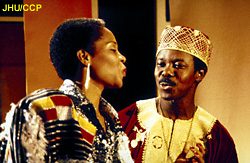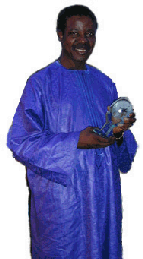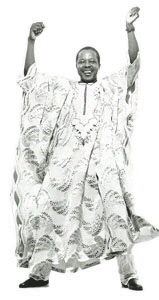General Information
Home Page
About Page
Friends Pics
What's New Page
Contact Page
Favorite Links
Poems
Guest Book
Nig Musicians and Act/Actores
Family Pics
Anoited Men of God
Jokes
Personal Pics
WOLE SHOYINKA
Wole Soyinka was born on 13 July 1934 at Abeokuta, in western Nigeria. After preparatory university studies in 1954 at Government College in Ibadan, he continued at the University of Leeds, where, later, in 1973, he took his doctorate. During the six years spent in England, he was a dramaturgist at the Royal Court Theatre in London 1958-1959. In 1960, he was awarded a Rockefeller bursary and returned to Nigeria to study African drama. At the same time, he taught drama and literature at various universities in Ibadan, Lagos, and Ife, where, since 1975, he has been professor of comparative literature. In 1960, he founded the theatre group, "The 1960 Masks" and in 1964, the "Orisun Theatre Company", in which he has produced his own plays and taken part as actor. He has periodically been visiting professor at the universities of Cambridge, Sheffield, and Yale.
First African writer to win the Nobel Prize for Literature in 1986. Also known for being in exile from the Nigerian government under Abacha. When Abacha was gone, and Abubakar took over, Wole Soyinka finally came home for a visit towards the latter part of October 1998, and many are hoping he will return permanently to help build the nation.

National Flag----- GREEN --- WHITE----GREEN


This is one of my favorite africa singers in Nigeria...... Oyenka and King Sunny Ade
KING SUNNY ADE

Born on Sunday 22nd September, 1946 in Ondo State, Sunday Anthony Ishola Adeniyi Adegeye, "Sunny Ade", had music flowing in his veins.
His father, Samuel Adegeye, was a part-time church organist and an itinerant trader, while his mother, Mariam, was a bean cake seller.
Sunny Ade spent a considerable part of his childhood in the arts center of Oshogbo, Osun State.
He attended the African Church Primary School and the Methodist School, Oshogbo between 1952 and 1960. In 1960, Sunny enrolled at the St. Charles Grammar School, Oshogbo. Between 1958 and 1963 he was a part-time percussionist with Sunday Ariyo and Idowu Owoeye's juju bands in Oshogbo.
In 1963, while in class three, Sunny Ade dropped out of college. And in mid '63 Sunny Ade ran away from home in Oshogbo to Lagos where he joined Moses Olaiya Adejumo's (Baba Sala) Federal Rhythm Dandies.
In 1965, after spending about 2 years with Adejumo, Sunny established his first group, Sunny Adex and His High Society Band. Later in 1966, Sunny changed the name of his group to Sunny Ade and The Green Spot Band.
Sunny's first record, "Alaanu L'Oluwa", released on African Songs label in 1967 sold a meager 13 copies.
Sunny Ade had his big break the following year in 1968, with the release of a chart topper, "Challenge Cup".
Between 1967 and 1974, Sunny Ade and The Green Spots released a total of 12 LPs on Chief Abioro's Africa Songs label.
But after a lengthy public court case involving contract disputes, he decided to leave African Songs to form his own recording company -- Sunny Alade Records, linked with Decca in London.
He also changed the name of the band to the African Beats.
They played a fast and spacey kind of juju music characterized by tight vocal harmonies and exquisite guitar works backed by traditional talking drums and percussion.
Since he was crowned the King of Juju music in 1977 King Sunny Ade has remained one of Nigeria's most popular musicians.
Starting with "E Kilo F'Omo Ode" in 1974, Sunny has been able to maintain a steady stream of Top Hits.
Some of his hits include:
The Late General Murtala Mohammed,
Synchro Chapter and
The Royal Sound.
Having secured his domestic reputation, Sunny Ade attempted to make inroads into the international market by signing with the British company, Island Records, in 1982.
Each release added to Sunny's stature as the leading juju musician, with lyrics reflecting his concern for social problems of Nigeria.
He continues to reinforce his growing international reputation with tours of the United States, Europe and Japan.
His father, Samuel Adegeye, was a part-time church organist and an itinerant trader, while his mother, Mariam, was a bean cake seller.
Sunny Ade spent a considerable part of his childhood in the arts center of Oshogbo, Osun State.
He attended the African Church Primary School and the Methodist School, Oshogbo between 1952 and 1960. In 1960, Sunny enrolled at the St. Charles Grammar School, Oshogbo. Between 1958 and 1963 he was a part-time percussionist with Sunday Ariyo and Idowu Owoeye's juju bands in Oshogbo.
In 1963, while in class three, Sunny Ade dropped out of college. And in mid '63 Sunny Ade ran away from home in Oshogbo to Lagos where he joined Moses Olaiya Adejumo's (Baba Sala) Federal Rhythm Dandies.
In 1965, after spending about 2 years with Adejumo, Sunny established his first group, Sunny Adex and His High Society Band. Later in 1966, Sunny changed the name of his group to Sunny Ade and The Green Spot Band.
Sunny's first record, "Alaanu L'Oluwa", released on African Songs label in 1967 sold a meager 13 copies.
Sunny Ade had his big break the following year in 1968, with the release of a chart topper, "Challenge Cup".
Between 1967 and 1974, Sunny Ade and The Green Spots released a total of 12 LPs on Chief Abioro's Africa Songs label.
But after a lengthy public court case involving contract disputes, he decided to leave African Songs to form his own recording company -- Sunny Alade Records, linked with Decca in London.
He also changed the name of the band to the African Beats.
They played a fast and spacey kind of juju music characterized by tight vocal harmonies and exquisite guitar works backed by traditional talking drums and percussion.
Since he was crowned the King of Juju music in 1977 King Sunny Ade has remained one of Nigeria's most popular musicians.
Starting with "E Kilo F'Omo Ode" in 1974, Sunny has been able to maintain a steady stream of Top Hits.
Some of his hits include:
The Late General Murtala Mohammed,
Synchro Chapter and
The Royal Sound.
Having secured his domestic reputation, Sunny Ade attempted to make inroads into the international market by signing with the British company, Island Records, in 1982.
Each release added to Sunny's stature as the leading juju musician, with lyrics reflecting his concern for social problems of Nigeria.
He continues to reinforce his growing international reputation with tours of the United States, Europe and Japan.
Olufunmilayo Ransome Kuti

She was the first Nigerian lady to drive in Nigeria. First woman politician in Nigeria or probably, in Africa. She was a women's right activist in the early 1900's. Olufunmilayo Ransome Kuti in 1944 formed the Abeokuta Women Union (later became a National Women Union). It was a union of 20,000 financial members. Their achievement includes: Objections against the Sole Native Authority and the King (Alake)who was their drummer boy. The king had to abdicate the throne. The union's education campaigns and objection to flat tax rate were all successful.
She was the administrator of Rev. Kuti Memorial Grammar School at Abeokuta. Her children include: Fela Anikulapo-Kuti, Olikoye Ransome-Kuti, and Beko Ransome-Kuti. She fought the military against the unjust arrest of her son (Fela) and sustained an injury to her leg of which the resultant compilations allegedly led to her death.
She was the administrator of Rev. Kuti Memorial Grammar School at Abeokuta. Her children include: Fela Anikulapo-Kuti, Olikoye Ransome-Kuti, and Beko Ransome-Kuti. She fought the military against the unjust arrest of her son (Fela) and sustained an injury to her leg of which the resultant compilations allegedly led to her death.
CHIEF EBENEZER OBEY
World-Known Juju Musician
BORN 27 AUGUST 1942, Abeokuta, Nigeria. Obey's earliest musical experiences were as a member of the local church choir while a child in Abeokuta - his parents, both devout Christians, were also members. In 1955, he joined the local band Ifelode Mambo, which despite its name was actually a juju outfit, playing guitar and thumb piano. He also played briefly with Fatayi Rolling Dollar and the Federal Rhythm Brothers Orchestra before moving to Lagos in 1963 and forming his own juju band, the International Brothers, in 1964. Under Obey's leadership, the International Brothers forged a highly individual style of juju. Abandoning the percussion and single-guitar style developed by I.K. Dairo , Obey added two more frontline guitars and electric bass, speeded up the tempo and simplified the beat. The formula struck an immediate chord with Nigerian juju fans. Obey enjoyed his first hit, 'Omo Lami', in 1965, followed by even greater success the following year with 'Olo Mi Gbo Temi'.
By the early 70s, Obey was rivalling King Sunny Ade in album output and sales, achieving major local hits with In London, On The Town , Board Members and Aiye Wa A Toro. In 1971, he renamed his band the Inter Reformers and retitled his style miliki system (essentially a shrewd marketing move, for the music continued in the same juju style he had introduced with the International Brothers, heavier and faster than that played by most of his peers). In 1972, he opened his Lagos nightclub, the Miliki Spot, and for the next two or three years reigned as the city's pre-eminent juju bandleader. By the mid-70s, however, Obey was beginning to be threatened by the younger Ade. Juju fans split into two camps: those who followed the Master Guitarist Ade, and those who favoured the sweetness of Obey's vocals and the philosophical nature of his lyrics. It was with their lyrics, above all, that the two men identified themselves. Ade's reflected his belief in traditional Yoruba religion, while Obey, always the perfect Christian gentleman, preached the orthodox values of love, the family and peace in the household. He also took on the role of Government spokesman, explaining the switch to the right-hand side that took place on Nigeria's roads in 1972, and the need to follow more recent campaigns, such as Operation Feed Yourself in 1976 (with Operation Feed The Nation), or the austerity measures that followed the end of Nigeria's oil-based boom in the early 80s. While Obey never achieved the international profile of Ade, he actually preceded the latter in the attempt. In 1980, he licensed six albums to the London-based OTI label (including Current Affairs and What God Has Joined Together). Lacking the promotional and financial muscle of a larger label like Island Records, with whom Ade signed in 1982, OTI were unable to sell Obey outside the expatriate Nigerian market and a small number of white enthusiasts. In 1983 he tried again, signing to Virgin Records, and releasing the adventurous funk and highlife infused Je Ka Jo. Grossly under-promoted, the album failed to convince expatriate Nigerians or make any impact on the growing white audience for juju. A similar fate befell the Virgin follow-up, Greatest Hits. A third attempt, with yet another label, the specialist independent Stern's, produced Solubon. It too failed to reap a sufficient audience. Ever resilient, Obey next set his sights on the US market, touring there to great acclaim - but with little effect on record sales - in 1985 and 1986. He continues, however, to be a major recording and performing artist at home in Nigeria. While Obey never achieved the international profile of Ade, he actually preceded the latter in the attempt. In 1980, he licensed six albums to the London-based OTI label (including Current Affairs and What God Has Joined Together). Lacking the promotional and financial muscle of a larger label like Island Records, with whom Ade signed in 1982, OTI were unable to sell Obey outside the expatriate Nigerian market and a small number of white enthusiasts. In 1983 he tried again, signing to Virgin Records, and releasing the adventurous funk and highlife infused Je Ka Jo. Grossly under-promoted, the album failed to convince expatriate Nigerians or make any impact on the growing white audience for juju. A similar fate befell the Virgin follow-up, Greatest Hits. A third attempt, with yet another label, the specialist independent Stern's, produced Solubon. It too failed to reap a sufficient audience. Ever resilient, Obey next set his sights on the US market, touring there to great acclaim - but with little effect on record sales - in 1985 and 1986. He continues, however, to be a major recording and performing artist at home in Nigeria
BORN 27 AUGUST 1942, Abeokuta, Nigeria. Obey's earliest musical experiences were as a member of the local church choir while a child in Abeokuta - his parents, both devout Christians, were also members. In 1955, he joined the local band Ifelode Mambo, which despite its name was actually a juju outfit, playing guitar and thumb piano. He also played briefly with Fatayi Rolling Dollar and the Federal Rhythm Brothers Orchestra before moving to Lagos in 1963 and forming his own juju band, the International Brothers, in 1964. Under Obey's leadership, the International Brothers forged a highly individual style of juju. Abandoning the percussion and single-guitar style developed by I.K. Dairo , Obey added two more frontline guitars and electric bass, speeded up the tempo and simplified the beat. The formula struck an immediate chord with Nigerian juju fans. Obey enjoyed his first hit, 'Omo Lami', in 1965, followed by even greater success the following year with 'Olo Mi Gbo Temi'.
By the early 70s, Obey was rivalling King Sunny Ade in album output and sales, achieving major local hits with In London, On The Town , Board Members and Aiye Wa A Toro. In 1971, he renamed his band the Inter Reformers and retitled his style miliki system (essentially a shrewd marketing move, for the music continued in the same juju style he had introduced with the International Brothers, heavier and faster than that played by most of his peers). In 1972, he opened his Lagos nightclub, the Miliki Spot, and for the next two or three years reigned as the city's pre-eminent juju bandleader. By the mid-70s, however, Obey was beginning to be threatened by the younger Ade. Juju fans split into two camps: those who followed the Master Guitarist Ade, and those who favoured the sweetness of Obey's vocals and the philosophical nature of his lyrics. It was with their lyrics, above all, that the two men identified themselves. Ade's reflected his belief in traditional Yoruba religion, while Obey, always the perfect Christian gentleman, preached the orthodox values of love, the family and peace in the household. He also took on the role of Government spokesman, explaining the switch to the right-hand side that took place on Nigeria's roads in 1972, and the need to follow more recent campaigns, such as Operation Feed Yourself in 1976 (with Operation Feed The Nation), or the austerity measures that followed the end of Nigeria's oil-based boom in the early 80s. While Obey never achieved the international profile of Ade, he actually preceded the latter in the attempt. In 1980, he licensed six albums to the London-based OTI label (including Current Affairs and What God Has Joined Together). Lacking the promotional and financial muscle of a larger label like Island Records, with whom Ade signed in 1982, OTI were unable to sell Obey outside the expatriate Nigerian market and a small number of white enthusiasts. In 1983 he tried again, signing to Virgin Records, and releasing the adventurous funk and highlife infused Je Ka Jo. Grossly under-promoted, the album failed to convince expatriate Nigerians or make any impact on the growing white audience for juju. A similar fate befell the Virgin follow-up, Greatest Hits. A third attempt, with yet another label, the specialist independent Stern's, produced Solubon. It too failed to reap a sufficient audience. Ever resilient, Obey next set his sights on the US market, touring there to great acclaim - but with little effect on record sales - in 1985 and 1986. He continues, however, to be a major recording and performing artist at home in Nigeria. While Obey never achieved the international profile of Ade, he actually preceded the latter in the attempt. In 1980, he licensed six albums to the London-based OTI label (including Current Affairs and What God Has Joined Together). Lacking the promotional and financial muscle of a larger label like Island Records, with whom Ade signed in 1982, OTI were unable to sell Obey outside the expatriate Nigerian market and a small number of white enthusiasts. In 1983 he tried again, signing to Virgin Records, and releasing the adventurous funk and highlife infused Je Ka Jo. Grossly under-promoted, the album failed to convince expatriate Nigerians or make any impact on the growing white audience for juju. A similar fate befell the Virgin follow-up, Greatest Hits. A third attempt, with yet another label, the specialist independent Stern's, produced Solubon. It too failed to reap a sufficient audience. Ever resilient, Obey next set his sights on the US market, touring there to great acclaim - but with little effect on record sales - in 1985 and 1986. He continues, however, to be a major recording and performing artist at home in Nigeria